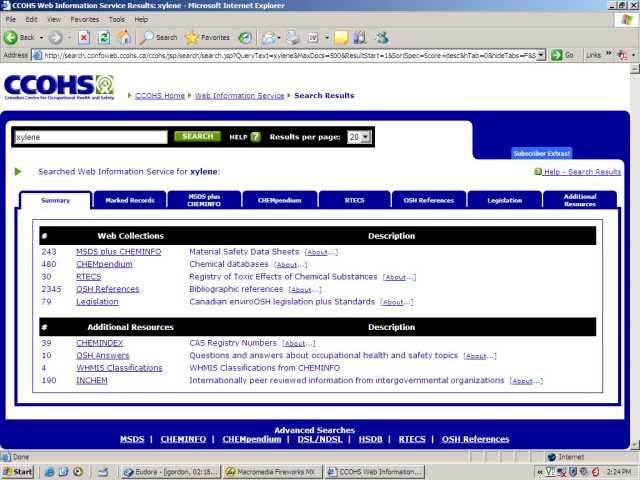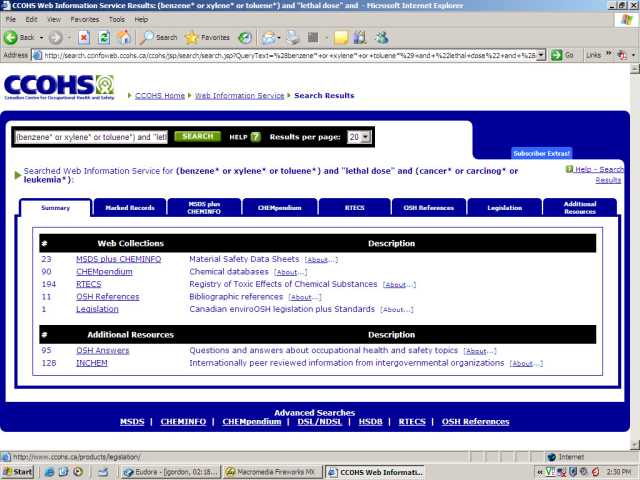| URLs in this document have been updated. Links enclosed in {curly brackets} have been changed. If a replacement link was located, the new URL was added and the link is active; if a new site could not be identified, the broken link was removed. |
Database Reviews and Reports
Databases of the Academic Support Program of the Canadian Center for Occupational Health and Safety (CCOHS)
Science Librarian
igordon@brocku.ca
Kimberly Lee
Health & Safety Information Officer
klee@brocku.ca
Brock University
St. Catharines, Ontario, Canada
The Canadian Centre for Occupational Health and Safety (CCOHS) Academic Support Program (ASP) is offered exclusively to universities and colleges to provide data and information on environmental, occupational health and safety issues. Access to information about workplace injury statistics, safety inspections, and due diligence on the ASP suite of chemical and occupational health and safety databases assists post-secondary institutions to create safe work environments.
CCOHS's ASP databases are used at Brock University as quick reference and bibliographic resources with links to over 130,000 current chemical fact and MSDS sheets and 200,000 citations to health and safety articles, reports, books, and conference papers. Faculty, staff, students, and visitors have campus-wide access using a wireless network to databases that can be searched using a simple meta search engine. Database searching is available for an unlimited number of users in offices, laboratories, chemical stores, shipping and receiving, etc. on and off campus. The ASP program provides a wealth of information and data to subscribers at a reasonable subscription price.
Databases
The ASP provides unlimited web access within the university's IP domain to data and bibliographic databases. These include {HSELINE} and {OSHLINE/NIOSHTIC} bibliographic databases, {MSDS}, {Fiches Techniques sur la Sécurité des Substances} (FTSS), {CHEMINFO}, {Registry of Toxic Effects of Chemical Substances} (RTECS), and CHEMINDEX chemical reference databases and the United Nations Conference on Environment and Development's (UNCED) IPCS INCHEM suite of databases. All CCOHS ASP databases are listed on Brock University's James A. Gibson Library list of {databases} and cross-referenced with lists of scientific subject-specific cross-listed databases including {Chemistry} and {Safety}. Additional CCOHS databases and web collections are available through separate subscriptions.A short description of CCOHS's ASP databases includes:
CHEMINDEX is a CCOHS database that indexes common, regulatory and chemical trade names to CAS Registry Numbers for all CCOHS chemical reference databases.
CHEMINFO1 is a CCOHS-generated database containing chemical profiles that is continually updated for selected workplace chemicals.
FTSS1 is a chemical reference database that is continually updated to include French language material safety data sheets.
HSELINE A generic bibliographic database developed and maintained by the UK Health and Safety Executive.
INCHEM Produced by the United Nations Conference on Environment and Development's (UNCED) IPCS INCHEM program. It provides statistical data, information and scientific research on a wide range of environmentally sensitive chemicals and biological agents.
MSDS1 is a chemical reference database that includes a comprehensive collection of current MSDS sheets that is continually updated for commercial workplace chemicals. The information for each chemical entry is prepared and supplied by producers.
NIOSHTIC2 is a bibliographic database that was produced by the US National Institute for Occupational Safety and Health (NIOSH) from 1973-1998.
OSHLINE2 is a CCOHS-generated bibliographic database that indexes core journals and reports to include archival and current research.
RTECS is the Registry of Toxic Effects of Chemical Substances (RTECS) chemical reference and toxicological database previously maintained by NIOSH and is now licensed through MDL Information Services, Inc. It includes data, information, and citations to scientific research for workplace chemicals and biological substances.
1 It is included as part of CCOHS's {Material Safety Data Sheets} (MSDS) aggregate database.
2 It is included as part of CCOHS's {Occupational Health and Safety References Collection} aggregate database
Search Engines
The main search engine facilitates searching across all CCOHS ASP databases. This search engine allows for a full range of searching strategies including Boolean search teams, truncation, wild cards, proximity, phrase, tagged field, and keyword searching. Searching is conducted using a mixture of keywords, common, chemical and trade names, appropriate IUPAC nomenclature and CAS Registry Numbers. The main search engine, although basic, is easily mastered by novice and infrequent searchers. Search results are displayed and grouped by individual databases. The searching strategies are complemented by the excellent help screens and links to bibliographic citation, full-text and reference records in HTML and PDF viewing formats.

ASP subscribers can mark and/or retrieve individual entries from designated databases as they go, a particularly useful feature when researching. The authors tested the ASP search engine by searching across all collections at http://ccinfoweb.ccohs.ca/asp/ using the keyword or chemical name "xylene." A total of 3,177 results were returned, with 278 additional references such as related occupational health and safety topics, CAS Registry Numbers, and WHMIS classifications.

The advanced search engines that are available for most databases allow for searching within database-specific tagged fields. Search results are initially displayed to include a short title and publication date for all entries, and can be further refined by the user by simply revising or amending original search statements.
Coverage
The coverage of health and safety information resources and peer-reviewed research is comprehensive, updated regularly, and includes an extensive archive file of early Twentieth Century reports and classic studies. Coverage includes almost all commercially available chemical compounds. On average, over 60,000 CCOHS records are added or replaced each quarter. In addition, CCOHS databases incorporate chemical reference data from a variety of government, commercial, academic, non-profit, Internet and chemical manufacturers. In summary, the ASP suite of databases is a one-stop resource for chemical safety, research and regulatory information.STN provides fee-based searching for several safety databases including NIOSHTIC, RTECS, and CCOHS's MSDS database.
CCOHS features include a Canadian "What's New" {Alerts and Bulletins} service, a comprehensive safety and related Acronyms database, an {Internet Resource Directory} and listings of e-mail discussion groups and distribution lists. In addition, CCOHS provides customer assistance and expert assistance to identify specific information, collections of chemicals and safety information by e-mail and phone.
CCOHS is currently exploring document delivery links to {CISTI} services. Additional services include a Chemical Notification Service for all subscribers included as Subscriber Extras! This service is an online updating service of new and/or changed content to several CCOHS databases that allows clients to track chemicals of personal or professional interest.
Usage
Government agencies, libraries and commercial chemical manufacturers have provided lists of free MSDS/safety databases available on the Internet. These resources include manufacturers' catalogs, {ChemFinder}, NIST Data Gateway, NIOSH family of databases and Rob Toreki's Where to Find Material Safety Data Sheets. CCOHS's ASP databases incorporate content from these resources in addition to data from unique international and commercial sources. The currency and inclusive nature of CCOHS databases provides institution-wide access to data and information for a variety of personnel working in a university or academic environment.They can assist shipping and receiving personnel in the distribution ofpackages; help chemical and biological stores staff coordinate chemical inventories; give cleaning staff information on the proper storage and usage of chemicals and cleaning products; aid lab supervisors in the investigation of spills or disposal of chemicals; illustrate to visual art majors mixing compounds; offer information to grounds crew staff using pesticides; be a resource to students conducting experiments and laboratory exercises; support occupational health & safety staff when conducting workshops; provide librarians with quick reference data; assist faculty in facilitating chemical literacy; and help researchers to identify potential hazards.Individual ASP databases at Brock are administered through the library and integrated with other {safety}, {chemistry}, and scientific databases.
Researchers, staff and students consult all ASP databases on a need-to-know basis. However, CCOHS's MSDS database is the most often consulted resource. This database contains current safety and regulatory information on chemical products manufactured or used in Canadian and U.S. workplaces. The ASP suite of databases is also used in conjunction with SciFinder Scholar's Registry File, Beilstein, MEDLINE, TOXLINE, Internet-based and other scientific databases.
Over 100 universities subscribe to the ASP at a base subscription of $1,000 per year for most institutions. Several academic libraries have created web-based tutorials and learning objects for CCOHS databases to supplement undergraduate and staff chemical safety and laboratory exercises.
Recommendations
Recommendations to improve the CCOHS ASP program include the incorporation of e-mail batch mailings, display and retrieval of search histories and the development of more robust main and advanced search engines. The content and currency of the OSHLINE database could be strengthened. The inclusion of research from occupational, health, safety, and chemical information journals, books, report, Internet sources, etc. would add value to this database. Further developments could include the incorporation of linking software to provide access to full-text references. CCOHS could explore the inclusion of additional CCOHS databases to the ASP program. CCOHS should also investigate improved sorting and displaying options of search results and the inclusion of bibliographic management software (i.e., RefWorks). Ultimately, CCOHS should explore ways to strengthen the collection of safety and chemical information. This could involve incorporating more MSDS chemical and biological data sheets from Internet, government, commercial and international sources. CCOHS should also investigate broadening the international coverage and scope of chemical, occupational health and safety research cited in the Occupational Health and Safety References Collection.In summary, the CCOHS ASP program is an excellent resource for academic, special and commercial libraries to provide end-users with critical information and assist institutions to promote workplace health and safety.
Contact
Laurie TironeCCOHS Marketing, Sales and Communications Canadian Centre for Occupational Health and Safety (CCOHS)
250 Main Street East
Hamilton, Ontario, Canada L8N 1H6
1-800-668-4284 (Canada & US)
E-mail: asp@ccohs.ca
| Previous | Contents | Next |
